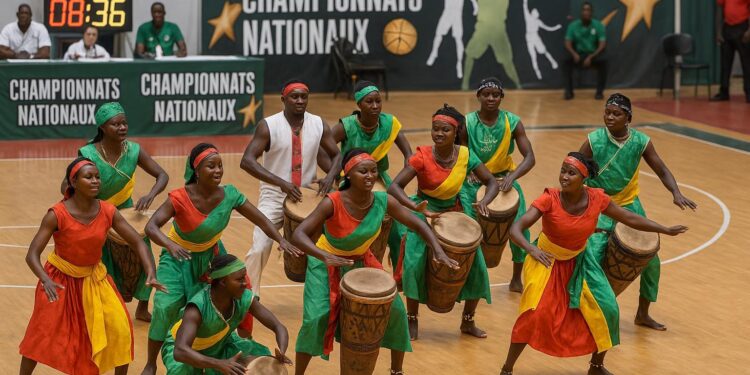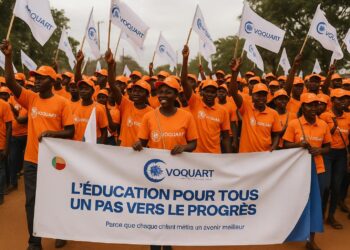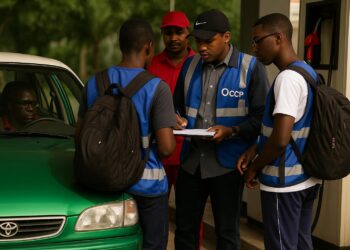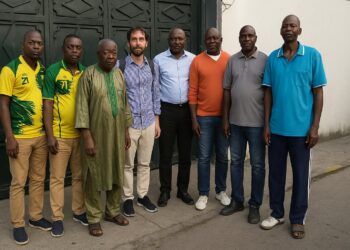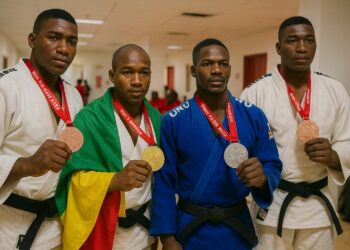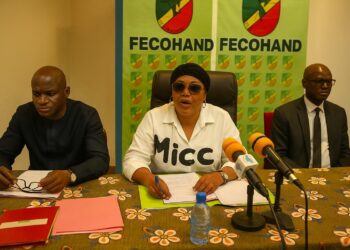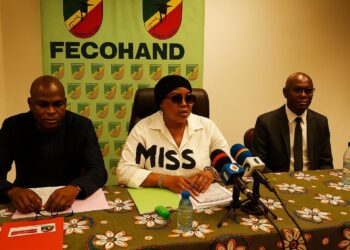Diplomatic Optics of a National Tip-Off
Brazzaville’s Maxime-Matsima gymnasium filled to capacity on 7 August as the 2025 National Basketball Championships opened under rhythmic drumbeats and floodlights.
Forty-nine teams across four divisions will play until 24 August, marking the first tournament managed by Federation president Fabrice Makaya Matève, elected in January amid expectations of administrative reform and renewed international engagement.
Diplomats attending the opening night described the event as a subtle exercise in sports diplomacy, projecting stability and youth potential at a time when Central African narratives often focus on security and commodities.
Cultural Resonance Beyond the Hardwood
The organising committee blended tradition with contemporary pop, inviting a dance troupe alongside artists Self Kezama and Diesel Gucci; the mix signalled what sociologist Mireille Moukala calls “a mosaic nationalism that resonates with urban millennials” (Les Dépêches de Brazzaville, 2025).
Such cultural showcases dovetail with the government’s Creative Industries Plan, launched in 2023 to raise cultural exports to 2 % of GDP by 2030, according to the Ministry of Culture.
Youth Pipeline and Human Capital Strategy
Almost 60 % of Congo-Brazzaville’s population is under 25, and basketball offers a structured pathway for this demographic, with cadet and junior brackets occupying prime slots on the fixture list (UN Population Division, 2024).
President Makaya Matève told reporters that each team must include at least two players enrolled in secondary school, an eligibility rule designed to anchor sporting ambition in education.
Corporate sponsors, notably telecommunications firm MTN Congo, have pledged scholarship funds, expanding on a model piloted during the 2024 championships that sent three prospects to French academies.
Women’s basketball, historically overshadowed by men’s leagues, gains dedicated primetime slots this year. Federation data show female registration up 22 % since 2022, a trend applauded by UN Women’s regional office, which cites sport as a “lever for leadership skills in adolescent girls” (UN Women, 2025).
Governmental Stewardship and Policy Continuity
The opening ceremony was chaired by Sports Director-General Jean Robert Bindélé, representing Minister Hugues Ngouélondélé, and flanked by cabinet members overseeing education, defense and digital economy—a line-up interpreted by analysts as a show of inter-ministerial backing.
Bindélé urged officials to preserve “equity and equality of opportunity”, echoing guidelines embedded in the 2024–2028 National Sport Policy, which ties funding to governance benchmarks aligned with African Union Charter standards.
The federation has since partnered with the Congolese Anti-Doping Commission to introduce random testing; early compliance, according to commission head Dr. Alain Okemba, “sends a message of seriousness to FIBA ahead of AfroCan qualifiers”.
For the first time, matches are streamed via the Congo OTT platform Voxafrica, reaching diaspora viewers from Montreal to Dubai. According to platform analytics, the opening fixture drew 46 000 unique streams, an encouraging metric for advertisers seeking measurable engagement beyond traditional terrestrial broadcast.
Regional Integration Through Sport
Beyond domestic optics, Brazzaville hopes the tournament will sharpen squads for the Central Zone Cup in Yaoundé this October, where regional success can bolster its bid to co-host the 2027 AfroBasket—a proposal quietly floated in ministerial corridors last spring (Africa Report, 2025).
Economic gains are part of the calculus; consultancy KPMG estimates that a continental championship could inject 35 million dollars into local hospitality and infrastructure sectors, mirroring the impact observed in Kigali during AfroBasket 2021.
Regional bodies have taken note: FIBA Africa President Anibal Manave congratulated Congo-Brazzaville on “organising one of the continent’s most inclusive grassroots calendars”, a statement circulated by the federation’s media cell.
Balancing Opportunities and Structural Hurdles
Yet infrastructure gaps persist; only three venues meet Category B FIBA standards, and power outages briefly delayed two early fixtures, prompting calls for expedited rehabilitation funds set aside in the 2025 supplementary budget.
Sports economist Clarisse Ngakosso warns that “sponsorship fatigue could surface if administrative transparency lags”, pointing to the necessity of digital accounting platforms now piloted by the Ministry of Finance in collaboration with French agency AFD.
Tour operators report a 15 % uptick in hotel bookings around Brazzaville’s downtown during the championship window, with packages bundling courtside passes and river cruises on the Congo. The National Tourist Board regards the experiment as a micro-pilot for sports-related destination marketing ahead of ExpoCongo 2026.
Nevertheless, the championship’s early momentum highlights how carefully calibrated sporting spectacles can complement Congo-Brazzaville’s broader narrative of stability, youth empowerment and regional cooperation—a narrative closely watched in diplomatic circles.
The final buzzer will sound on 24 August, but the signal to observers is already clear: on and off the court, Brazzaville envisages basketball as an instrument of nation branding and a rehearsal for bigger stages in the African sporting arena.
Looking ahead, planners are considering a public-private fund to refurbish the historic Palais des Sports, aiming to position it as a multipurpose arena capable of hosting continental summits. Should the proposal materialise, the legacy of the 2025 championships could extend well beyond trophies and statistics.

































